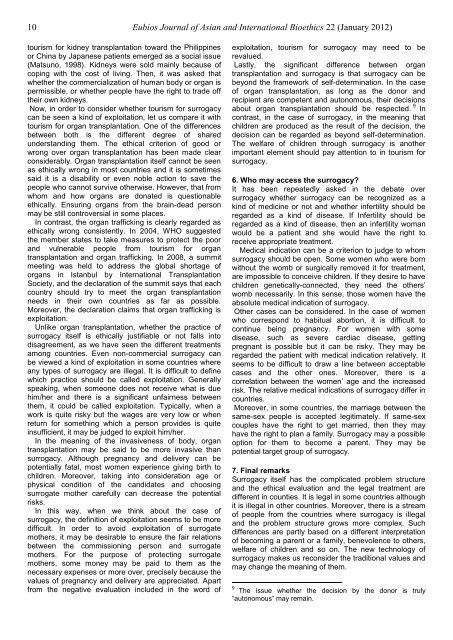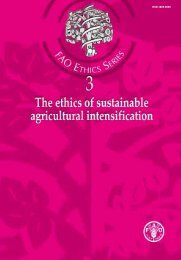Eubios Journal of Asian and International Bioethics - Eubios Ethics ...
Eubios Journal of Asian and International Bioethics - Eubios Ethics ...
Eubios Journal of Asian and International Bioethics - Eubios Ethics ...
You also want an ePaper? Increase the reach of your titles
YUMPU automatically turns print PDFs into web optimized ePapers that Google loves.
10 <strong>Eubios</strong> <strong>Journal</strong> <strong>of</strong> <strong>Asian</strong> <strong>and</strong> <strong>International</strong> <strong>Bioethics</strong> 22 (January 2012)<br />
tourism for kidney transplantation toward the Philippines<br />
or China by Japanese patients emerged as a social issue<br />
(Matsuno, 1998). Kidneys were sold mainly because <strong>of</strong><br />
coping with the cost <strong>of</strong> living. Then, it was asked that<br />
whether the commercialization <strong>of</strong> human body or organ is<br />
permissible, or whether people have the right to trade <strong>of</strong>f<br />
their own kidneys.<br />
Now, in order to consider whether tourism for surrogacy<br />
can be seen a kind <strong>of</strong> exploitation, let us compare it with<br />
tourism for organ transplantation. One <strong>of</strong> the differences<br />
between both is the different degree <strong>of</strong> shared<br />
underst<strong>and</strong>ing them. The ethical criterion <strong>of</strong> good or<br />
wrong over organ transplantation has been made clear<br />
considerably. Organ transplantation itself cannot be seen<br />
as ethically wrong in most countries <strong>and</strong> it is sometimes<br />
said it is a disability or even noble action to save the<br />
people who cannot survive otherwise. However, that from<br />
whom <strong>and</strong> how organs are donated is questionable<br />
ethically. Ensuring organs from the brain-dead person<br />
may be still controversial in some places.<br />
In contrast, the organ trafficking is clearly regarded as<br />
ethically wrong consistently. In 2004, WHO suggested<br />
the member states to take measures to protect the poor<br />
<strong>and</strong> vulnerable people from tourism for organ<br />
transplantation <strong>and</strong> organ trafficking. In 2008, a summit<br />
meeting was held to address the global shortage <strong>of</strong><br />
organs in Istanbul by <strong>International</strong> Transplantation<br />
Society, <strong>and</strong> the declaration <strong>of</strong> the summit says that each<br />
country should try to meet the organ transplantation<br />
needs in their own countries as far as possible.<br />
Moreover, the declaration claims that organ trafficking is<br />
exploitation.<br />
Unlike organ transplantation, whether the practice <strong>of</strong><br />
surrogacy itself is ethically justifiable or not falls into<br />
disagreement, as we have seen the different treatments<br />
among countries. Even non-commercial surrogacy can<br />
be viewed a kind <strong>of</strong> exploitation in some countries where<br />
any types <strong>of</strong> surrogacy are illegal. It is difficult to define<br />
which practice should be called exploitation. Generally<br />
speaking, when someone does not receive what is due<br />
him/her <strong>and</strong> there is a significant unfairness between<br />
them, it could be called exploitation. Typically, when a<br />
work is quite risky but the wages are very low or when<br />
return for something which a person provides is quite<br />
insufficient, it may be judged to exploit him/her.<br />
In the meaning <strong>of</strong> the invasiveness <strong>of</strong> body, organ<br />
transplantation may be said to be more invasive than<br />
surrogacy. Although pregnancy <strong>and</strong> delivery can be<br />
potentially fatal, most women experience giving birth to<br />
children. Moreover, taking into consideration age or<br />
physical condition <strong>of</strong> the c<strong>and</strong>idates <strong>and</strong> choosing<br />
surrogate mother carefully can decrease the potential<br />
risks.<br />
In this way, when we think about the case <strong>of</strong><br />
surrogacy, the definition <strong>of</strong> exploitation seems to be more<br />
difficult. In order to avoid exploitation <strong>of</strong> surrogate<br />
mothers, it may be desirable to ensure the fair relations<br />
between the commissioning person <strong>and</strong> surrogate<br />
mothers. For the purpose <strong>of</strong> protecting surrogate<br />
mothers, some money may be paid to them as the<br />
necessary expenses or more over, precisely because the<br />
values <strong>of</strong> pregnancy <strong>and</strong> delivery are appreciated. Apart<br />
from the negative evaluation included in the word <strong>of</strong><br />
exploitation, tourism for surrogacy may need to be<br />
revalued.<br />
Lastly, the significant difference between organ<br />
transplantation <strong>and</strong> surrogacy is that surrogacy can be<br />
beyond the framework <strong>of</strong> self-determination. In the case<br />
<strong>of</strong> organ transplantation, as long as the donor <strong>and</strong><br />
recipient are competent <strong>and</strong> autonomous, their decisions<br />
about organ transplantation should be respected. 9 In<br />
contrast, in the case <strong>of</strong> surrogacy, in the meaning that<br />
children are produced as the result <strong>of</strong> the decision, the<br />
decision can be regarded as beyond self-determination.<br />
The welfare <strong>of</strong> children through surrogacy is another<br />
important element should pay attention to in tourism for<br />
surrogacy.<br />
6. Who may access the surrogacy?<br />
It has been repeatedly asked in the debate over<br />
surrogacy whether surrogacy can be recognized as a<br />
kind <strong>of</strong> medicine or not <strong>and</strong> whether infertility should be<br />
regarded as a kind <strong>of</strong> disease. If Infertility should be<br />
regarded as a kind <strong>of</strong> disease, then an infertility woman<br />
would be a patient <strong>and</strong> she would have the right to<br />
receive appropriate treatment.<br />
Medical indication can be a criterion to judge to whom<br />
surrogacy should be open. Some women who were born<br />
without the womb or surgically removed it for treatment,<br />
are impossible to conceive children. If they desire to have<br />
children genetically-connected, they need the others’<br />
womb necessarily. In this sense, those women have the<br />
absolute medical indication <strong>of</strong> surrogacy.<br />
Other cases can be considered. In the case <strong>of</strong> women<br />
who correspond to habitual abortion, it is difficult to<br />
continue being pregnancy. For women with some<br />
disease, such as severe cardiac disease, getting<br />
pregnant is possible but it can be risky. They may be<br />
regarded the patient with medical indication relatively. It<br />
seems to be difficult to draw a line between acceptable<br />
cases <strong>and</strong> the other ones. Moreover, there is a<br />
correlation between the women’ age <strong>and</strong> the increased<br />
risk. The relative medical indications <strong>of</strong> surrogacy differ in<br />
countries.<br />
Moreover, in some countries, the marriage between the<br />
same-sex people is accepted legitimately. If same-sex<br />
couples have the right to get married, then they may<br />
have the right to plan a family. Surrogacy may a possible<br />
option for them to become a parent. They may be<br />
potential target group <strong>of</strong> surrogacy.<br />
7. Final remarks<br />
Surrogacy itself has the complicated problem structure<br />
<strong>and</strong> the ethical evaluation <strong>and</strong> the legal treatment are<br />
different in counties. It is legal in some countries although<br />
it is illegal in other countries. Moreover, there is a stream<br />
<strong>of</strong> people from the countries where surrogacy is illegal<br />
<strong>and</strong> the problem structure grows more complex. Such<br />
differences are partly based on a different interpretation<br />
<strong>of</strong> becoming a parent or a family, benevolence to others,<br />
welfare <strong>of</strong> children <strong>and</strong> so on. The new technology <strong>of</strong><br />
surrogacy makes us reconsider the traditional values <strong>and</strong><br />
may change the meaning <strong>of</strong> them.<br />
9 The issue whether the decision by the donor is truly<br />
“autonomous” may remain.

















